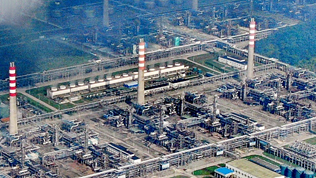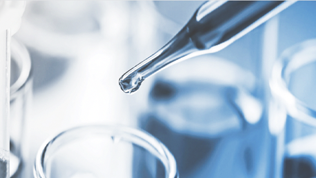Products and Services of Sinopec Catalyst Company
Sinopec Catalyst Company provides more than 200 types of professional catalyst products across 6 categories, including oil refining, polyolefin, basic organic raw materials, coal chemical industry, environmental protection, adsorbents and additives.
Oil-refining catalysts
Oil-refining catalysts mainly include catalytic cracking catalyst, hydrogenation catalyst and reforming catalyst.
1.Catalytic cracking catalyst is used to efficiently convert inferior heavy oil into light oil and chemical raw materials using various devices and processes such as MIP-CGP, MIP, DCC, CPP, RTC, LTAG, FDFCC, MFP, ARGG, MCP and MGD.
2.Hydrogenation catalyst is used to clean various types of oil raw materials and products such as gasoline, diesel, kerosene, lubricant, naphtha, wax oil, mineral oil, heat transfer oil, solvent oil and reforming oil in hydrocracking, hydrofining and residual oil hydrogenation units.
3.Reforming catalysts include continuous reforming catalyst and semi-regenerative reforming catalyst, which are used to produce clean light oil and aromatic hydrocarbon with high octane number and low sulfur content.
Polyolefin catalysts
Polyolefin catalysts mainly include polyethylene catalyst, polypropylene catalyst and polybutene catalyst.
1.Polyethylene catalyst is used to produce high-performance synthetic resin products in various polyethylene process units and conditions such as GPE, CX, Innovene G, Innovene S, 2-peak Spherilene C, Spherilene, Hostalen, Luptec G, Unipol, Bostar, Total, ADL liquid, Ring Pipe and 3-Ring Pipe.
2.Polypropylene catalyst is used to produce high-performance synthetic resin products in various polypropylene process units and conditions, such as ST, SPG, JPP Horizon, Hypol-I, Hypol-II, Innovene P, Innovene S, Spheripol, Spherizone, Unipol, Novolen, HOEST and Small-bulk Batch Process.
Catalysts for basic organic raw materials
Catalysts for basic organic raw materials mainly include: catalyst for toluene disproportionation and transalkylation, catalyst for ethylbenzene dehydrogenation to styrene, catalyst for propylene ammoxidation to acrylonitrile, catalyst for terephthalic acid refining Pd/C, catalyst for ethylene acetoxylation to vinyl acetate, primary/secondary catalyst for hydrogenated pyrolysis gasoline, amorphous alloy catalyst, catalyst for reforming oil to diolefin, platinum/chromium catalyst for propane dehydrogenation to propylene, catalyst for liquid-phase/gaseous-phase benzene alkylation with ethylene to ethylbenzene, catalyst for benzene alkylation with propylene to cumene, silver catalyst for ethylene oxidation to ethylene oxide, C2/C3 selective hydrogenation catalyst, Ti-Si molecular sieve, catalyst for oxidative dehydrogenation of butane to butadiene, catalyst for hydrogen peroxide by anthraquinone process, catalyst for propylene oxide by propylene oxidation, C5/C6 alkane isomerization catalyst, xylene isomerization catalyst and phthalic anhydride/maleic anhydride catalyst. This type of catalyst is used to efficiently produce important raw materials such as ethylene, benzene, xylene, terephthalic acid, ethylene oxide, ethylene glycol, styrene, acrylonitrile and vinyl acetate.
Catalysts for coal chemical industry
Catalysts for coal chemical industry mainly include SMTO catalyst, catalyst for CO coupling to DMO and catalyst for DMO hydrogenation to ethylene glycol, which are used to efficiently produce ethylene, propylene and other low-carbon olefins from methanol.
Environmentally friendly catalysts
Environmentally friendly catalysts mainly include S Zorb adsorption desulfurization catalyst and SCR denitration catalyst.
1.S Zorb adsorption desulfurization catalyst is used to produce clean gasoline products with ultra-low sulfur content and excellent octane number retention from sulfur-containing gasoline fractions.
2.SCR denitration catalyst can be used to meet the requirements of realizing ultra-low emissions of nitrogen oxides in the flue gas emitted from chemical boilers.
Adsorbents and additives
Adsorbents mainly include 5A small ball molecular sieve dewaxing adsorbent, p-xylene PX.adsorbent, m-xylene MX.adsorbent, C5/C6 adsorbent for separation of N-alkane and Isoalkanes. Additives mainly include sulfur transfer additive for reducing flue gas, NOx additive for reducing regenerated flue gas in catalytic cracking, catalytic cracking additive for propylene yield increase, catalytic cracking additive for high liquid recovery and additive for combustion.
1.5A small ball molecular sieve dewaxing adsorbent is used to separate normal alkanes from isoalkanes and aromatic hydrocarbons in linear-chain alkylbenzene production units.
2.P-xylene PX.adsorbent and m-xylene MX.adsorbent are used to separate and produce high-purity p-xylene and m-xylene from mixed C-8 aromatics.
3.C5/C6 adsorbent for separation of N-alkane and isoalkane is used to continuously and efficiently separate N-alkane from isoalkane. N-alkane is an excellent blending component in gasoline, and isoalkane produces clean gasoline with high octane number through isomerization.
4.Sulfur transfer additive for reducing flue gas is used to effectively reduce Sox emissions in FCC regeneration flue gas.
5.NOx additive for reducing regenerated flue gas in catalytic cracking is used to effectively reduce NOx emissions in regenerated flue gas of catalytic cracking.
6.Catalytic cracking additive for propylene yield increase is used to increase propylene concentration in catalytic cracking, and enhance the cracking capacity of heavy oil, thus improving light oil recovery.
7.Catalytic cracking additive for high liquid recovery is used to efficiently convert catalytic-cracking residue into high-value liquid products.
8.Additive for combustion is used to achieve high-efficiency CO combustion in catalytic cracking, controlling the stability of dilute phase of regenerator or synchronously controlling NOx emissions.

 Address
Address Post code
Post code Tel
Tel












 粤公網安備11123123223211
粤公網安備11123123223211